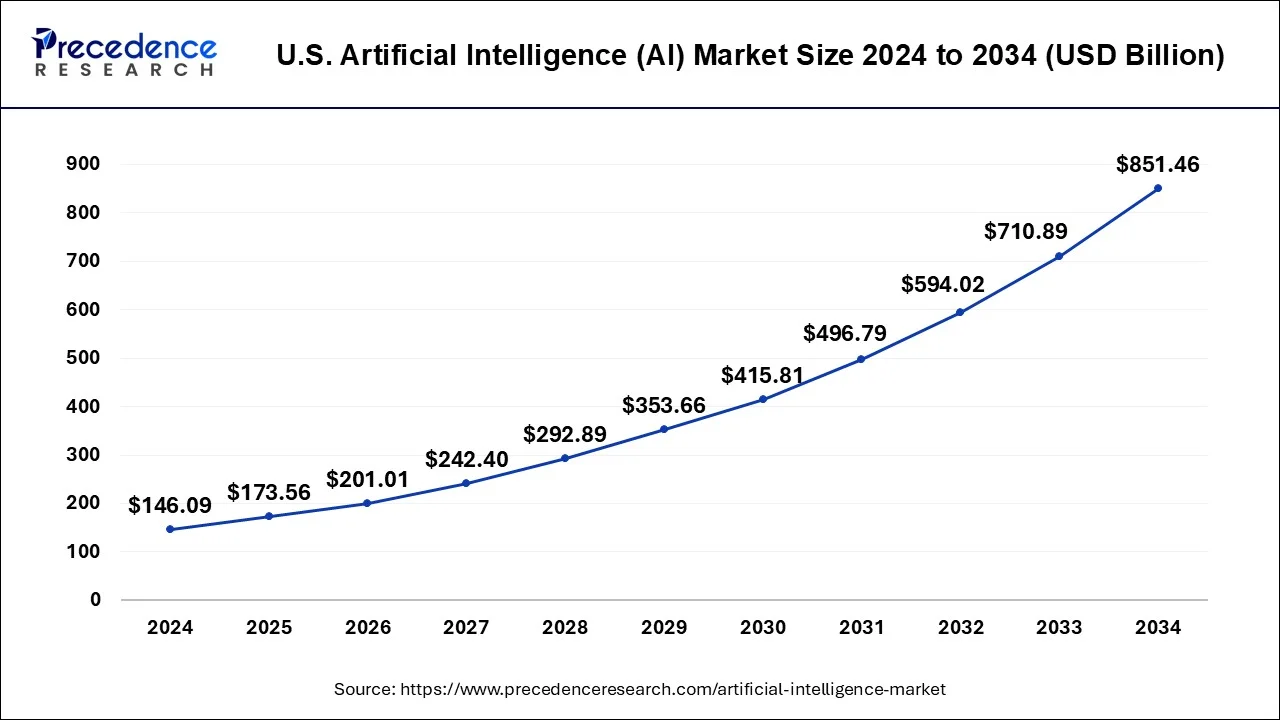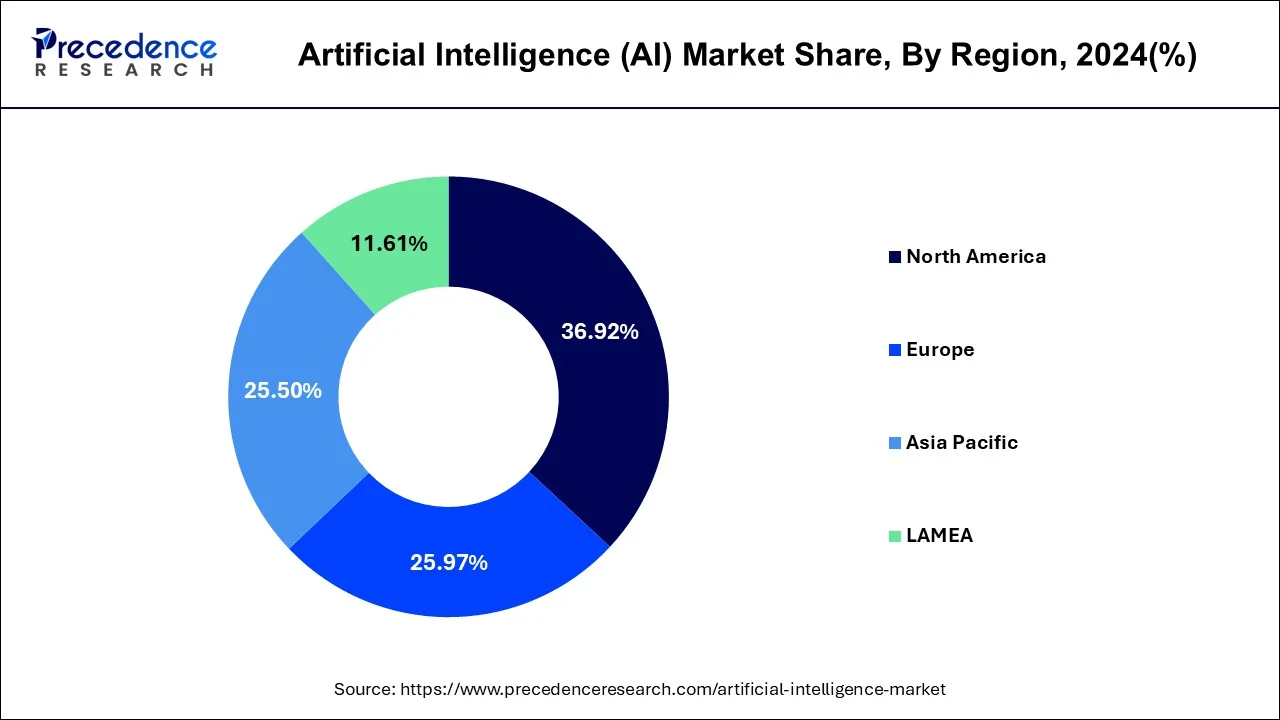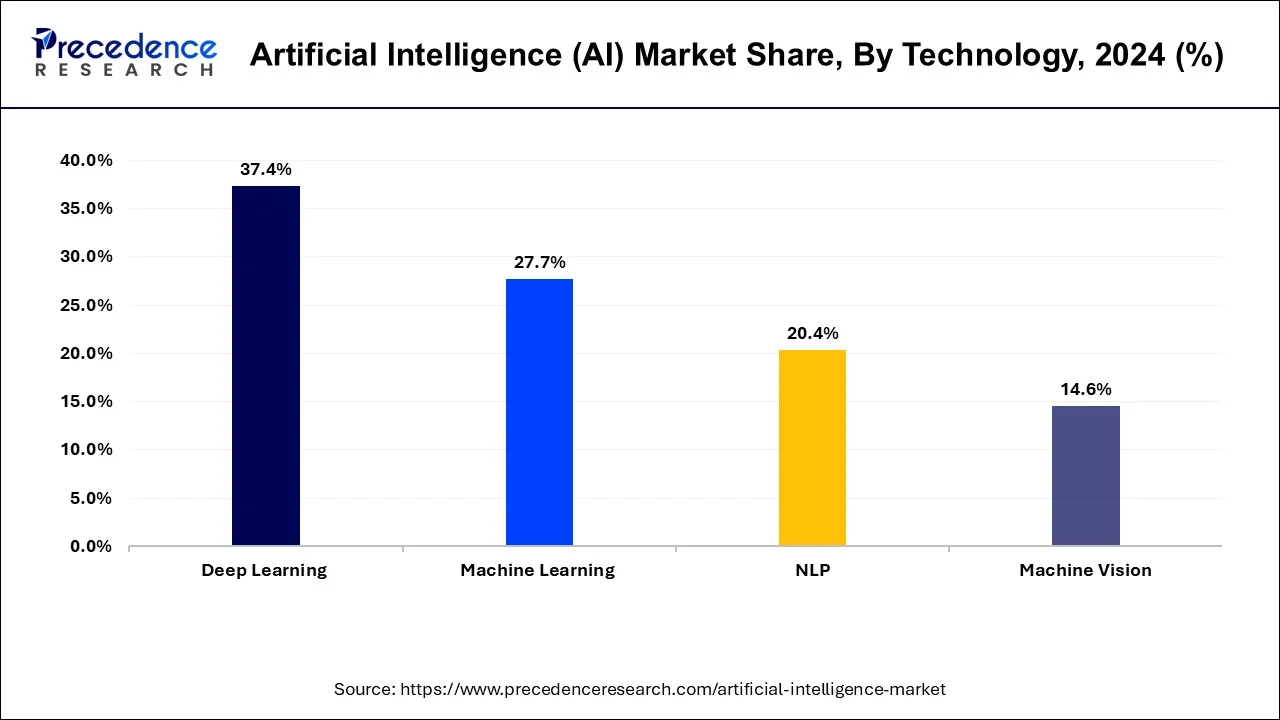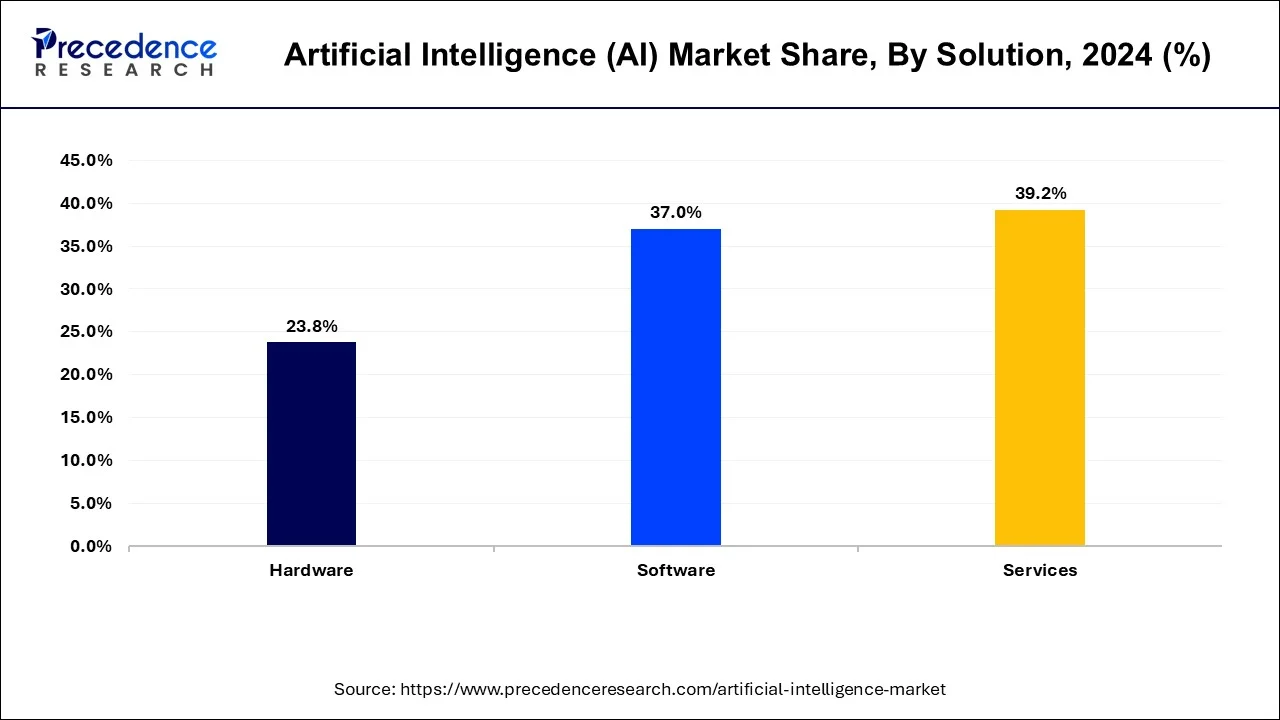March 2025
The global artificial intelligence (AI) market size was USD 638.23 billion in 2024, calculated at USD 638.23 billion in 2025 and is expected to reach around USD 3,680.47 billion by 2034, expanding at a CAGR of 19.20% from 2025 to 2034.

The U.S. artificial intelligence (AI) market size was estimated at USD 146.09 billion in 2024 and is predicted to be worth around USD 851.46 billion by 2034, at a CAGR of 19.33% from 2025 to 2034.

North America has garnered the largest market share in 2024. The higher demand for automated and technologically advanced hardware and software products across various end-use verticals and the favorable government policies that encourages the industries in North America to adopt artificial intelligence has significantly contributed towards the growth of the artificial intelligence market. In 2019, the American president launched an American initiative to promote US as leader in the artificial intelligence technology. This initiative focused at adoption of AI based systems by providing guidelines for the real life application of artificial intelligence technology in various industries and sectors. North America is the home to the leading tech giants such as Facebook, Amazon, Google, IBM, Microsoft, and Apple, which have significant contributions in the development of the AI market in North America.
In the realm of the artificial intelligence (AI) market, North America emerges as the dominant player, a position bolstered by supportive government initiatives aimed at fostering AI adoption across a multitude of industries.
Significant investments in AI research and development have led to the establishment of specialized research institutes and centers that focus on advancing AI technologies. These governmental efforts not only emphasize safety and innovation but also extend into critical sectors like healthcare, where AI is revolutionizing diagnostics and treatment methodologies.
U.S. Artificial Intelligence Market Trends:
Companies and research institutions in the U.S. are leading the charge in crafting groundbreaking robotic technologies that harness the power of AI to perform a diverse array of tasks, from industrial manufacturing to everyday household chores.
The relentless pursuit of AI innovation, combined with public and private sector collaboration, positions North America at the forefront of the global AI landscape, driving advancements that could reshape economies and societies alike.

Asia-Pacific is the fastest-growing segment in the artificial intelligence market. Government support lays down the grounds for startups that provide AI-driven health systems. The rapid digitalization and the necessity of AI-driven software are boosting the market growth. In addition, the adoption of AI solutions in different sectors, including healthcare, manufacturing, retail, finance, and transportation, has driven the market growth
Europe is expected to grow significantly in the artificial intelligence market during the forecast period. The use of AI in Europe in various sectors is increasing. Mostly the transportation and research sectors are utilizing AI for various purposes. Furthermore, to make them safe for use, various regulations are also being implemented by the government as well as regulatory bodies. Thus, this results in market growth.
The use of AI in the research sector is increasing in the UK. At the same time, AI also helps in enhancing the development as well as the production phase in various innovations. This, in turn, encourages the development of novel innovations.
The companies in Germany are adapting to the use of AI in transportation as well as in other sectors. With the use of AI safety features, along with other necessary developments, is becoming easier to develop. Thus, the use of AI can enhance various applications in different sectors.
The rapid penetration of digital technologies and the internet has significantly contributed to the growth of the global artificial intelligence market in the past few years. The heavy investments by the tech giants in research and development are continuously fueling technological advancements in various industries. The burgeoning demand for artificial technology among the various end-use verticals such as automotive, healthcare, banking & finance, manufacturing, food and beverages, logistics, and retail is expected to significantly drive the growth of the global artificial intelligence market in the forthcoming years. Technological innovations have been always an important part of the majority of industries.
The rising popularity of various life-saving medical devices and the self-driving feature in the new electric vehicles is significantly boosting the growth of the AI market across the globe. The shifting focus of the globe towards the digitalization is positively impacting the market growth. The top global tech giants such as Google, Microsoft, IBM, Amazon, and Apple are increasing their investments in the upgradation and development of various applications of AI. The rising efforts of the tech giants towards improving the access to the AI is expected to foster the growth of the global AI market during the forecast period.
Favorable government initiatives are expected to impose a positive impact on industry growth. The establishment of subcommittees on machine learning and AI within the federal government has drawn the traction towards the AI industry. In 2020, The Government of India increased the spend for Digital India to $477 million to boost AI, IoT, big data, cyber security, machine learning and robotics. The artificial intelligence market is expected to witness significant growth in the BFSI sector on account of data mining applications as there is an increase in the adoption of artificial intelligence solutions in data analytics, fraud detection, cybersecurity, and database systems.
End-use industries have started integrating artificial intelligence into their business processes to streamline their operations. The artificial intelligence technology is gaining momentum as it assists enduser organizations to become more efficient and result oriented. The growing adoption of artificial intelligence is encouraging new entrants to venture into the AI marketplace by offering niche applicationspecific products and solutions. Furthermore, companies are also taking several strategic initiatives in industry consolidations to gain competitive advantages.
Economical parallel processing set-up
The artificial intelligence industry has been a software player so far, and very few companies manufacture hardware components such as CPU, ASIC, FPGA, and GPU. Recent trends in design tools have made FPGAs compatible with complex software practices and accessible to those who organize and build algorithm models. Hardware-based artificial intelligence solutions are being introduced to combat challenges associated with power consumption, sluggish processing, and lack of efficiency. Furthermore, as the market is maturing, there is an increasing need for creating a new business model through predictive, efficient automation and scalable parallel processing capabilities.
The need for hardware-based artificial intelligence products was recognized as end-use applications that demanded lower power and higher performance. Over the past few years, very few companies ventured into the development of these components. However, to gain a competitive advantage, vendors such as IBM Corporation and Intel Corporation have started manufacturing artificial intelligence chipsets to obtain high performance in scaling dynamic processes parallelly.
Technology Trends
Supplier Trends
Regulatory Trends
Supplier Trends
| Report Coverage | Details |
| Market Size in 2025 | USD 757.58 Billion |
| Market Size by 2034 | USD 3,680.47 Billion |
| Growth Rate from 2024 to 2034 | CAGR of 19.20% |
| Base Year | 2024 |
| Forecast Period | 2025 to 2034 |
| Segments Covered | Technology, Solution, End Use, and Regions |
| Regions Covered | North America, Asia Pacific, Europe, Latin America, Middle East and Africa |
Rising implementation from the finance sector
The global finance sector is witnessing a major shift with the rapid acceptance of artificial intelligence technology. The rising implementation of artificial intelligence in the finance sector is transforming industry in several ways. Artificial intelligence is being used for algorithmic trading, fraud detection and credit risk assessment. It enables quicker and more accurate data analysis, leading to better investment decisions along with risk management. AI carries the ability to process large amounts of data and also aids in identifying patterns and trends that human agents might miss. Overall, artificial intelligence is enhancing operational efficiency, reducing costs and improving customer experience in the finance sector.
Transparency in decision making
Artificial intelligence models and algorithms are generally complex. The complex nature of models makes it difficult to understand the process of decision making. Artificial intelligence-based solutions often generate outcomes that come up with black box nature, this can lead to lack of trust and accountability. This is particularly concerning in critical areas such as finance and healthcare. These industries or end users have a delicate need for transparency in order to protect the proprietary. Thus, transparency issues in decision making hamper the growth of the market.
Rising acceptance from research scientists
Research scientists are increasingly embracing artificial intelligence technology due to its transformative capabilities. This trend is expected to be continued in the upcoming years while offering an opportunity for the artificial intelligence market to expand. Technology accelerates data analysis, identifies patterns and aids in complex stimulations, enabling breakthroughs across diverse sectors. Ai-powered tools streamline repetitive tasks, liberating scientists to focus on innovation. In many fields, research scientists have started appreciating the importance and potential of AI to predict outcomes, discover hidden insights and optimize experiments. Overall, the scientific community recognizes AIs role in amplifying research efficiency and driving new discoveries, leading to a more symbiotic relationship between technology and human expertise.
Lack of skilled professionals
The system with artificial intelligence technology needs skilled professionals, whereas the shortage or lack of such skilled and qualified professionals creates a major challenge for the market. Artificial intelligence technologies require specialized expertise in areas like machine learning, data science and software engineering. The demand for these professionals exceeds the supply, leading to talent shortages that can slow down AI development, implementation and innovation. Moreover, this shortage can limit the scalability and effectiveness of AI solutions across various industries. Thus, the lack of skilled professionals is observed to act as a challenge for the market’s expansion.
The deep learning segment accounted largest market share in 2024. This dominance is attributable to its complex applications driven by the data such as audio, video, and text recognition. The rising technological advancements in the field of deep learning is expected to overcome the challenges associated with the high volumes of data. Furthermore, the rising adoption of the deep learning technology in the medical field is expected to further fuel the growth of the segment during the forecast period.

The huge share of the machine learning in the total investments in AI technology is fueling its adoption in various applications such as hypothesis generation, clustering, altering, tagging, clustering, filtering, visualization, and navigation promotes the development of the cognitive solutions. The rising deployment of the on-premises hardware and cloud computing platforms for handling and storing huge volumes of data has significantly contributed to the rise of the data analytics platforms. The rising investments by the top tech giants in the innovation and research are expected to fuel the growth of the AI market in the upcoming future.
Global Artificial Intelligence (AI) Market Revenue, By Technology, 2022-2024 (USD Billion)
| Technology | 2022 | 2023 | 2024 |
| Deep Learning | 165.98 | 196.83 | 233.69 |
| Machine Learning | 122.59 | 145.43 | 172.72 |
| NLP | 91.33 | 108.31 | 128.50 |
| Machine Vision | 74.22 | 87.57 | 103.33 |
The services segment held a 39.2% share of the market while being the dominating segment in 2024. The dominance of the services segment in the market is attributed to the convenience and scalability offered by artificial intelligence (AI) as a service while deploying AI applications. Generally, AI projects are complex, they require multidisciplinary expertise in areas including computer vision, natural language processing and machine learning. Services are being utilized widely to bring together a diverse set of skills and resources to tackle such complex projects effectively.

In addition, AI service providers often offer tailored or customized solutions with expertise while implementing AI technologies. This makes it easier for businesses to adopt artificial intelligence technology without any extensive expertise.
Global Artificial Intelligence (AI) Market Revenue, By Solution, 2022-2024 (USD Billion)
| Solution | 2022 | 2023 | 2024 |
| Hardware | 109.20 | 129.66 | 154.22 |
| Software | 168.85 | 200.24 | 237.86 |
| Services | 176.08 | 208.23 | 246.14 |
The BFSI segment held the largest and a total of 17.4% share in 2024, the segment is expected to witness a significant growth during the forecast period. Artificial intelligence (AI) solutions are widely being adopted in the banking and finance sector for multiple purposes including account inquiries, loan applications, fraud detection and credit score monitoring. The BFSI sector becomes an ideal candidate for the AI application owing to the massive amount of data the sector generates on a daily basis. The demand for 24/7 frictionless service from the banking and finance sectors promotes the growth of the segment, as AI-powered tools are capable of offering customer service interactions by generating reliable outcomes for raised queries.
According to a study by Mckinsey, AI has the potential to increase the value of the global banking sector by up to $1 Trillion per year. Whereas according to the recently published report by Business Insider stated that, with the implementation of AI banks are anticipated to save up to $447 billion by the end of 2023. The BFSI sector is expected to remain at the forefront owing to the fastest adoption of AI solutions to reduce manual errors in banking and other finance-related operations.
Global Artificial Intelligence (AI) Market Revenue, By End User, 2022-2024 (USD Billion)
| End User | 2022 | 2023 | 2024 |
| Healthcare | 64.33 | 76.35 | 90.48 |
| BFSI | 72.59 | 86.13 | 102.26 |
| Law | 15.96 | 19.02 | 22.67 |
| Retail | 43.83 | 52.13 | 62.06 |
| Advertising & Media | 63.19 | 74.97 | 88.96 |
| Automotive & Transportation | 45.41 | 53.84 | 63.87 |
| Agriculture | 29.26 | 34.78 | 41.39 |
| Manufacturing | 43.44 | 51.58 | 61.49 |
| Others | 76.11 | 89.34 | 105.04 |
By Solution
By Technology
By End-Use
By Region
For inquiries regarding discounts, bulk purchases, or customization requests, please contact us at sales@precedenceresearch.com
No cookie-cutter, only authentic analysis – take the 1st step to become a Precedence Research client
March 2025
December 2024
December 2024
December 2024